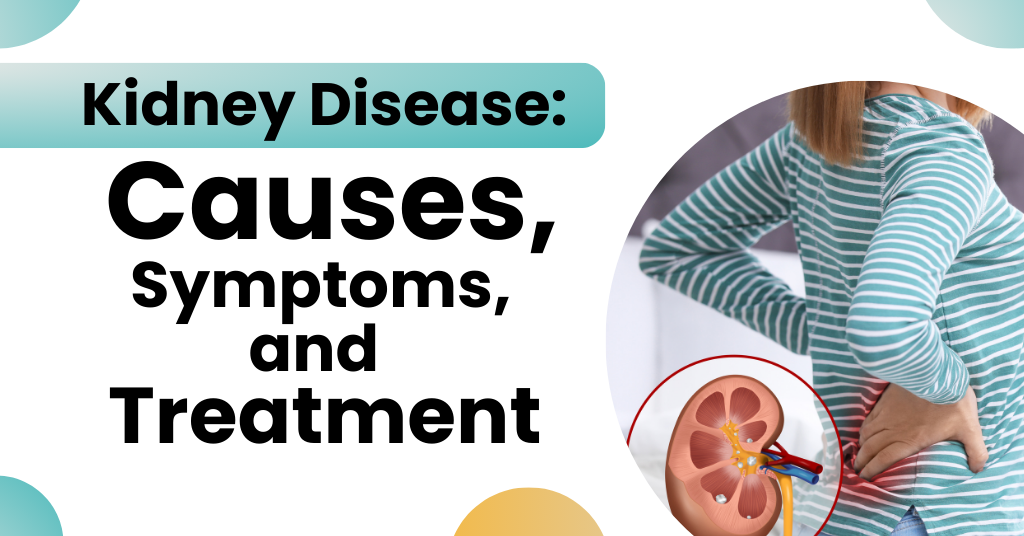What is Kidney Disease?
Kidneys are two bean-shaped organs, with each being approximately the size of a fist. It filters out extra water and waste from your blood and helps in urine formation. When kidneys get damaged or any kind of problem occurs, it is called Kidney Disease or nephropathy. It balances electrolytes and produces hormones that regulate blood pressure. These functions are essential to maintain the body’s general health. Diabetes and high blood pressure increase the risk of renal damage. Acute renal damage, cysts, renal stones and infections are some of the renal problems.
Early kidney diagnosis is essential for effective disease treatment and management. Regular check-ups and health screenings can help in identifying renal problems before they progress into a more severe state. The most common diagnostic tests are urine and blood tests to determine renal function, including the glomerular filter rate (GFR) and protein levels. If renal problems are discovered, additional renal function tests could be conducted to identify the root cause.
Kidney disease has various forms with unique causes, signs, and treatment methods. Different forms of renal disorders include the following:
Chronic Kidney Disease (CKD):
Chronic Kidney Disease (CKD) refers to a condition that develops slowly over time and causes loss of kidney function. In this, your kidneys have been damaged and are not able to filter the blood the way they should. Diabetes, hypertension, heart disease, and a family history of renal failure are the key risk factors for kidney disease development.
Acute Kidney Injury (AKI):
Acute renal failure (AKI) is a quick, rapid loss of kidney function. AKI occurs suddenly and is often reversible if identified and treated promptly. AKI can range from mild dysfunction to severe impairment, and it is a serious medical condition that requires immediate attention.
Polycystic Kidney Disease (PKD):
Polycystic Kidney disease (PKD) is a hereditary condition in which the kidneys produce fluid-filled cysts that impair renal function. It is among the most prevalent renal illnesses that run in families.
Causes of Kidney Disease:
There are many different Causes of Kidney Disease, and to stop or slow down the damage to the kidneys from getting worse, it is crucial to recognise and treat these causes. The following are a few typical causes of renal disease:
- Diabetes: Kidney disease is primarily caused by diabetes. High blood sugar levels risk damaging renal blood vessels over time and affect renal function.
- Hypertension, or elevated blood pressure: If left unchecked, hypertension can damage the kidneys’ small blood vessels, making it more difficult to filter waste products and keep the right amount of fluid and electrolytes in the body.
- Glomerulonephritis: This describes inflammation of the kidney’s tiny filters, called glomeruli. Infection, autoimmune diseases, or other causes can cause kidney damage.
- Infections: Renal inflammation and damage can result from conditions that affect the kidneys, such as pyelonephritis, a bacterial kidney infection.
Symptoms of Kidney Disease:
There are many Symptoms of Kidney Disease. By identifying which, we can detect kidney disease
- Decreased Urine Output: Producing less urine or having no urine output is a common symptom of renal failure. Changes in the frequency of urination may accompany this.
- Fluid Retention: Renal disease causes a buildup of fluid in the body, leading to swelling in the legs, ankles, feet, face, and hands. Excess fluid may also lead to sudden weight gain.
- Fatigue and Weakness: Feeling constantly tired, weak, or lacking energy is one of its symptoms. Waste product buildups and toxins in the body may cause this trait.
- Shortness of Breath: It also results in difficulty breathing and shortness of breath.
- Loss of Appetite and Nausea: Renal failure can cause a loss of appetite, leading to decreased food intake. Nausea and vomiting may also occur.
- Itching and Skin Rashes: Waste products can accumulate in the blood and result in dry skin and constant irritation. Skin rashes and changes in skin colour may also be observed.
- Sleep Problems: This can disrupt sleep patterns, leading to insomnia, restless legs syndrome, or frequent urination at night.
- Muscle Cramps and Restlessness: Electrolyte imbalances and fluid retention can contribute to muscle cramps, especially in the legs. Restlessness and an inability to keep still may also be present.
How to Manage Kidney Problems:
Management of renal problems usually involves a combination of medical intervention, lifestyle changes, and a balanced diet. Considering the renal problem, we should proceed with our treatment only after consulting the doctor.
Here are some general strategies to consider.
Medical System: Strictly follow the medicines prescribed by the doctors.
Dietary Changes:
- low-fat dairy products
- limited sodium intake
- Follow the diet plan prescribed by your doctors.
- Stay hydrated, but follow any fluid restrictions provided by your healthcare provider.
Lifestyle Modifications:
- Maintain a healthy BMI through a balanced diet and regular exercise, but consult a doctor before starting any new activity.
- Do not smoke and consume alcohol.
Blood pressure control:
Adopting a heart-healthy diet may be beneficial for controlling blood pressure. The DASH diet(Dietary Approaches to Stop Hypertension) is often recommended, which includes:
- Consumption of fruits and vegetables
- Whole grains
- lean proteins
Regular follow up:
- Keep regular checkups with your health care team
- Discuss any changes in symptoms or concerns immediately.
- Working Out Regularly:
Regularly indulging in physical activities can help lower blood pressure. Aim for at least 150 minutes a week of moderate-to-intense activity, such as cycling, brisk walking, or swimming.
Many get Allopathic Kidney Treatment, commonly known as traditional or Western medicine. Its medicinal system uses pharmaceutical drugs and medical procedures to treat diseases. https://bharathomeopathy.com/diseases/kidney-failure-treatmentAdditionally, many side effects of allopathic medicines have been observed, due to which patients have to face many problems. After that, the patient’s condition becomes the same or worse, which may have side effects. However, this is not seen in homeopathic medicines.
Why Bharat Homeopathy is Best for Kidney Treatment
Homeopathic Treatment for Kidney Health usually involves individualised prescriptions based on the patient’s specific symptoms and overall health. Lifestyle changes and medications are essential for effective management and preventing further complications.
Homeopathic Treatment for Kidney aims to strengthen the life force to overcome the disease with its inherent vitality. Homeopathy renal treatment aims to treat the patient at all levels, physical, mental and emotional, and the treatment is tailored according to each patient’s specific needs. Patients receiving treatment at Bharat Homeopathy Clinic are advised to take certain precautions along with regular follow-ups.
Patients have chosen Bharat Homeopathy for Homeopathic Treatment of Kidney diseases. The patients are living a healthy life today after recovering through homoeopathy treatment. Here, all the patients’ questions are taken care of so that they can live healthy lives. The patient is given a proper diet chart and high-quality homoeopathic medicines made from natural ingredients as required. It has no harmful effects, and the treatment is 100% safe.


